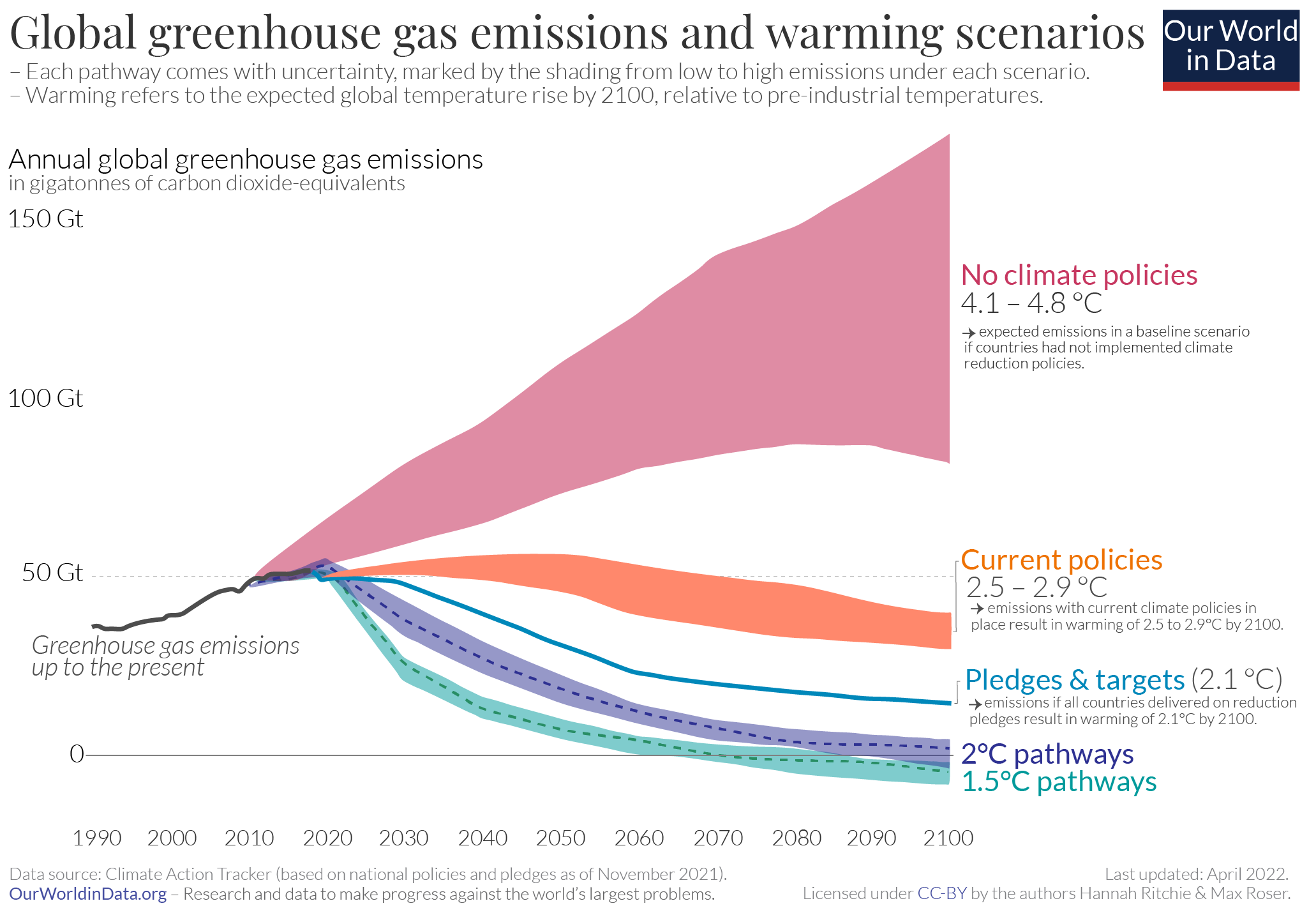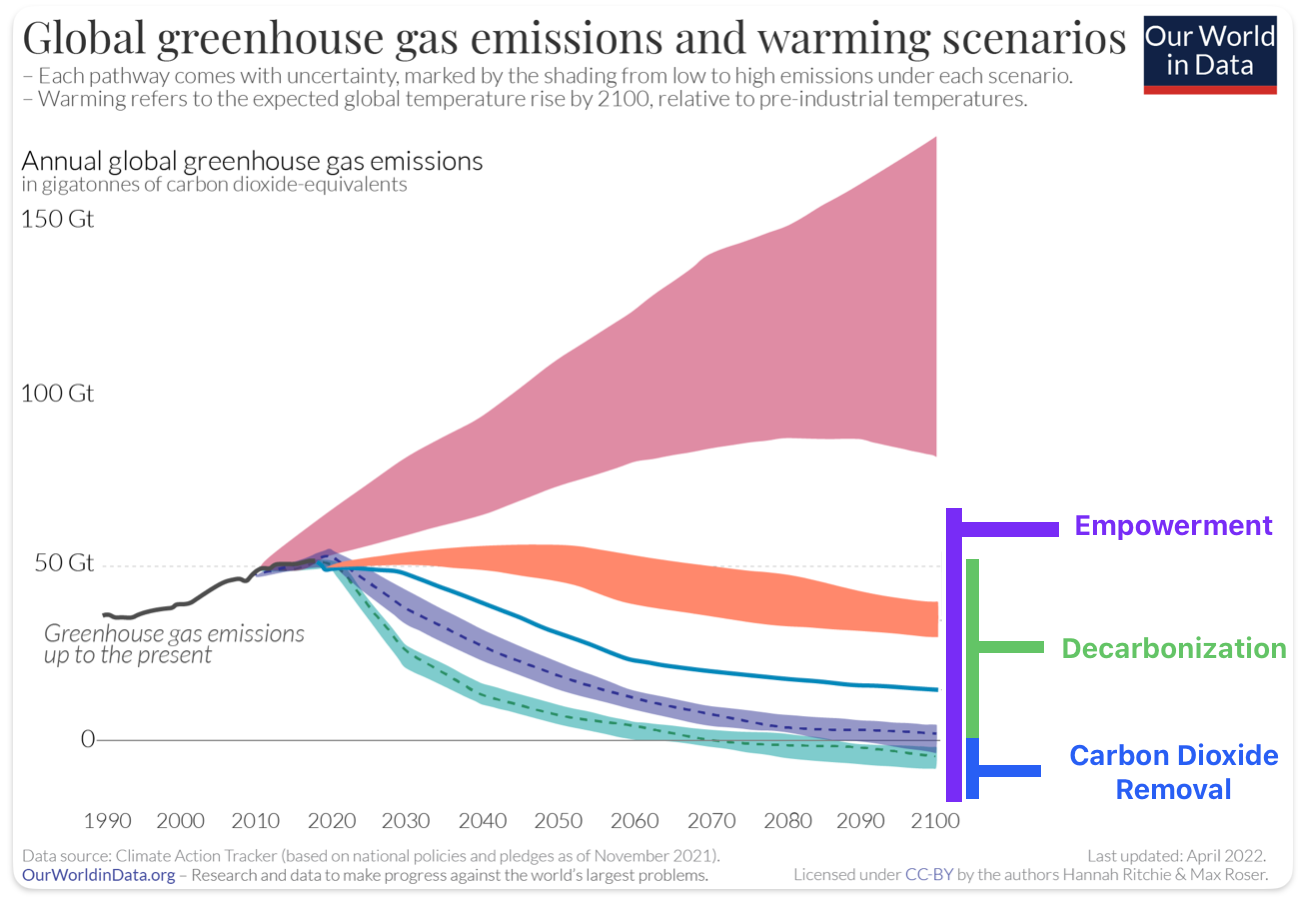The Three Big Areas of Climate Work in 2023
Happy Earth Day! In this post I wanted to share some thoughts from my climate journey so far, since it may be useful to others who are just starting out. For California readers, I encourage you to consider getting involved in SB. 308 – You can find out more here.
When I decided to change careers with a goal of working on climate a little over 4 years ago, I really had no idea where to start. At the time, I naively thought "working on climate" meant working at green energy companies: Building wind turbines or solar panels. While I wasn't sure where exactly I would fit in, I knew I'd want to be building things, so I set my sights on a Mechanical Engineering degree and got to work – both on school and trying to figure out how best I could eventually help.
As my senior year comes to a close, my focus has become a lot sharper. I've learned a megaton about how working on the climate is done, and this is my attempt to distill that for others.
First, it is important to note there is a strong sentiment in climate communites that in the near future, every job will be a climate job: The challenge facing us is so large, it will require everyone to realize and care about their carbon output and work towards ways of minimizing it – both from an individual and collective (company, community, organization, etc) perspective. That said, there are a lot of people or companies who can be considered as fully working on climate today, and I'd like to do a small breakdown of the vast variety of those roles.
The One Chart

If there's one chart you'll see a lot of in climate, it's this one. Chances are, you've seen it before, or at least one that's similar. It well-illustrates the challange ahead, and the major amount of change we need to hold warming to only 1.5°C.
This chart is also useful in structuring how I think about climate work, which I've separated into three main areas below: Empowerment, Decarbonization, and Carbon Dioxide Removal (CDR).

Let's talk a little bit about each:
Empowerment
This area might better be described as "Platforms, Finance, Policy, Advocacy, and Education", but that doesn't have quite the same ring to it. While these roles aren't directly reducing or removing emitted greenhouse gasses, they provide the structure and support to allow both those activities to happen, so it's an extremely important area. I've lumped them together because there is also a lot of crossover between organizations working on say, advocacy and education, or finance and policy.
Some organizations in this space are: Work On Climate and Climatebase both offer training and job boards for those looking to work in climate. Lower Carbon Capital is a venture capital fund focused exclusively on cutting edge climate projects. Watershed is an online platform to help companies track their climate programs, and similarly, Patch connects certified carbon credit sellers and buyers. CarbonPlan, a 501(3)(c), is a think-tank that has published some of the most meaningful research on compliance, permanence, as well as other helpful tools. Finally, the OpenAir Collective hosts events, open-source projects, podcasts, and other climate-focused missions.
Decarbonization
Many of the jobs here are within traditional and existing companies. I would define it as any role with a primary objective of reducing or eliminating GHGs from an existing process/product. This includes everything from energy companies making wind turbines and solar panels to legacy auto makers working on all-electric vehicles and the battery researchers and manufacturers who support them. We have to decarbonize all the things is an oft-heard phrase in climate circles.
Though there are so many companies doing decarbonization work, I'd like to highlight a few newer and or bigger companies I think are doing really cool work here: Redwood Materials is making lithium-ion car batteries recyclable, and Sakuu is making 3D-printed solid-state batteries, using significantly less material. FirstSolar is one of the largest PV panel manufacturers and based right here in the US. NextEra is one of the largest owner/operators of solar and wind power plants in America. Molten is working on clean hydrogen production for heavy industry, and Nitricity is doing the same for nitrogen/fertilizer production.
Carbon Dioxide Removal (CDR)
This, to me, is the most exciting area of climate work. Humanity is undertaking a massive, intentional geoengineering project on a scale of which has never been done before – to undo the massive and unintentional geoengineering project which has been in place for the past century or so. The goal is to be at gigaton-scale CO2 removal by mid-century or earlier, but we aren't even at megaton-scale yet. If you'd like to know more, Ryan Orbuch wrote the seminal piece on CDR in 2020: We Need To Take CO2 Out Of The Sky. There are now lots of companies are starting up to tackle this challenge, all with their own truly innovative and exciting technologies.
Here's a few that I've been super impressed by: Heirloom has a process to capture CO2 using an accelerated carbon mineralization process (with rocks, basically). Ebb Carbon is doing something similar but with seawater and electrochemistry, which has the helpful by-product of increasing ocean alkalinity. Charm Industrial is pyrolyzing (burning without oxygen) farm waste, which removes carbon from the carbon cycle and turns it into a liquid which is easy to store. Phykos and Running Tide and making seaweed farms which can sink to the bottom of the ocean to durably store carbon there. Lithos is working with farms to store CO2 more effectively in agricultural settings.
The breadth and scope of this projects is stunning and so exciting, and with $3.7B in funding from the Biden infrastructure bill, you're sure to hear more about them in the future.
Finding a Place in Climate Work
This "Three Big Areas" view of climate roles is not the only way to break down the field of climate work. To me, it is just a lens with which to take a wide-angled view. One of the useful things about this view is that it shows all types of work have an important place in this field. So much so, it would be an injustice to call it "cross-disciplinary", as it is literally all disciplines.
For those wanting to participate—or rather, get a head start—the question then becomes "what skills do I have and how can I put those to work?". You shouldn't feel excluded just because you don't have a degree in Chemical Engineering or Environmental Justice. (Though maybe you do! Or maybe you want to pursue those things, that's great too!) The point is, your existing skills are valuable, and with so many great companies and projects growing in the field, there is likely a place for you. (Hint: Many of the organizations listed above have job openings!)

Thanks for reading. If you're curious for more, my recommended jumping off point would be the starter packs from Work on Climate.
You can follow me on Mastodon if you'd like.